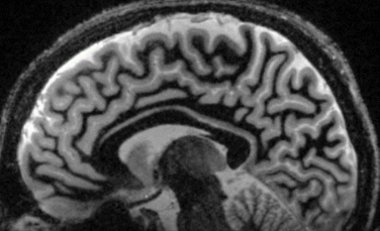First patient scanned on 7T scanner
A child with epilepsy has been the first patient scanned on the 7 Tesla as part of research into focal cortical dysplasia in children.
 The first patient has been scanned on the 7 Tesla, the ultra-high field MRI system acquired by King’s College London’s School of Biomedical Engineering & Imaging Sciences operating at Guy’s and St Thomas’ NHS Foundation Trust.
The first patient has been scanned on the 7 Tesla, the ultra-high field MRI system acquired by King’s College London’s School of Biomedical Engineering & Imaging Sciences operating at Guy’s and St Thomas’ NHS Foundation Trust.
The unprecedented high resolution clinical images were completed in a clinically feasible scan time, better equipping clinicians with information as to whether to proceed with surgery for the child.
The research project has been led by King’s College London researchers Dr Jonathan O'Muircheartaigh, Senior Research Fellow at Forensic & Neurodevelopmental Sciences and Perinatal Imaging & Health and Dr David Carmichael, Reader in Magnetic Resonance Imaging at the School of Biomedical Engineering & Imaging Sciences. King’s College London researchers worked in partnership along with researchers from King’s Health Partners, the Institute of Child Health at UCL, and Great Ormond Street Hospital for Children NHS Foundation Trust.
Dr David Carmichael said:
We will determine that 7T is better at viewing these lesions and if it improves the outcomes for these children, then we will be able to offer this more widely so that many children in the UK will be able to benefit.
The epilepsy surgery service in England for paediatrics is coordinated across a handful of centres working together, which makes it powerful. This means if we validate the use of 7T scans in these patients, it will be possible for children from across England to access the service as part of their epilepsy surgery programmes.
On why this study is so important, CO-I Prof Helen Cross, Head of the Developmental Neuroscience Programme at UCL-Great Ormond Street Institute of Child Health said:
This study allows us to prepare for much more detailed imaging in children with epilepsy across London. Specifically in the longer term it will lead us to a much greater understanding of the brain in children with epilepsy, and likely will enhance the pre-surgical evaluation in those where surgery may be an option in treatment.
Dr Jonathan O’Muircheartaigh, Senior Research Fellow at Forensic & Neurodevelopmental Sciences and Perinatal Imaging & Health, King’s College London, said:
In children with difficult to treat epilepsy, brain abnormalities such as focal cortical dysplasias, can be particularly difficult to detect. The higher resolution and anatomical detail that we have available with 7T MRI has huge potential to more accurately detect these lesions and support clinicians and families with their planning of care.
The paediatric patient underwent the scan as part of research project into focal cortical dysplasia in children, a part of the grey matter of the brain that has not formed properly, causing epilepsy and seizures which are resistant to drug treatment.
This is the most common type of abnormality in these children and surgery can often be an effective treatment; but for the surgery to be effective, clinicians need to identify the part of the brain responsible for generating the seizures and have that removed.
The cortex, the outermost layer of the brain, primarily made up of grey matter, is only two to three millimetres wide. Subtle abnormalities can be hard to detect on normal MRI scans, and it can be difficult to locate the part of the brain responsible for seizures. The more powerful magnet of the 7T allows clinicians to take higher resolution images meaning if those scans can identify the subtle cortical abnormalities, clinicians can present a stronger hypothesis to surgeons to operate.
The scanner, manufactured by Siemens Healthineers, is known as the London Collaborative Ultra-Highfield System (LoCUS) and is operating at Guy’s and St Thomas’ NHS Foundation Trust and in a collaborative research space, clinical preparation area and engineering lab to help push forward new imaging methods and technologies. Specific scans have been developed including the featured image above by Dr Sila Dokumaci, Department of Biomedical Engineering, King’s College London, as part of these projects.
King’s Health Partners Neurosciences delivers outstanding research and education and drives excellence in care and equity for patients with neurological conditions.